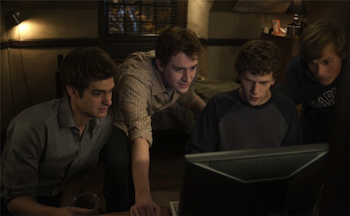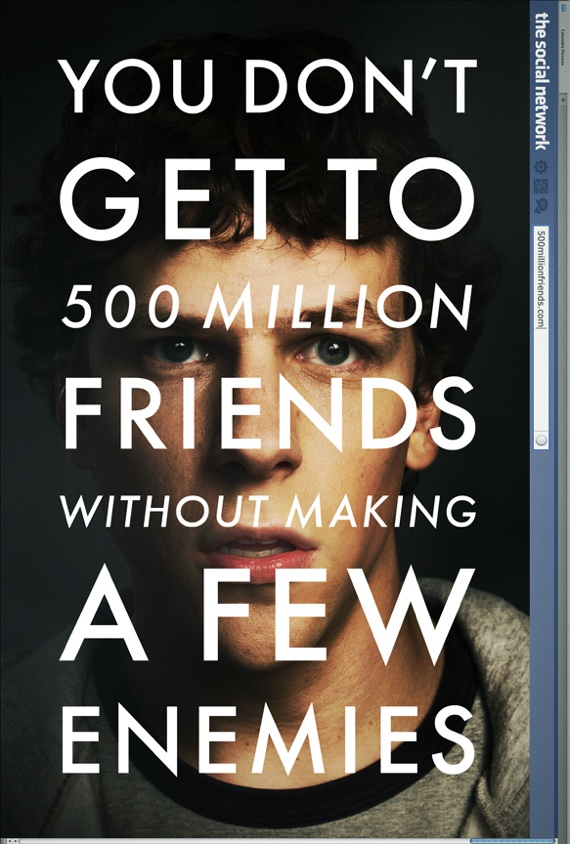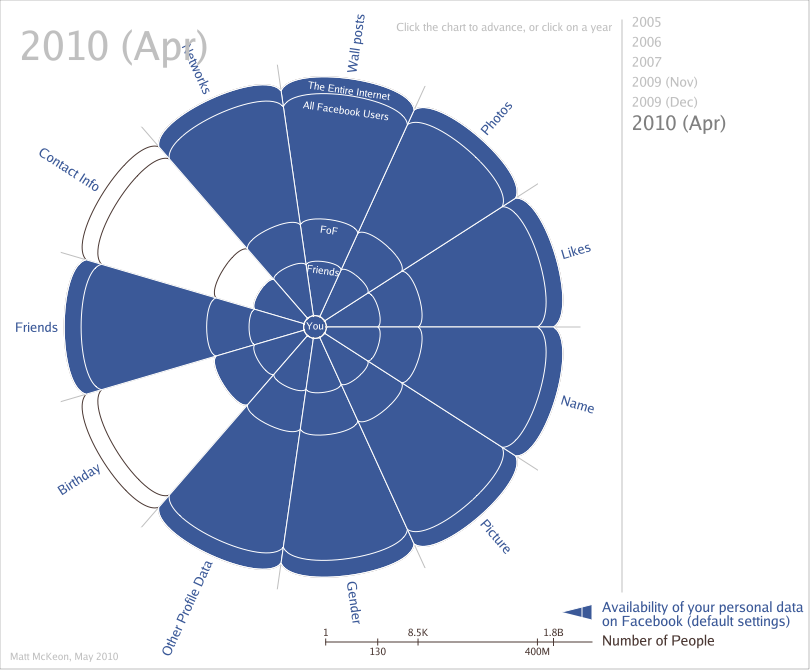The Anti-Social Network
Tama Leaver / Curtin University

A film about writing a piece of software and two lawsuits about who really owns that software doesn’t sound like blockbuster material, but that’s exactly the premise behind The Social Network (2010) penned by Aaron Sorkin, of West Wing fame, and directed by David Fincher, best known for Fight Club (1999). Despite the seemingly dry premise, powered by Sorkin’s amazing dialogue and Fincher’s eye for pacing and casting, the film has done remarkably well, largely embraced by critics, and for a film in which nothing blows up and no one gets shot at, it has taken an impressive $175 million (U.S.) at the global box office thus far. Of course, the real story is about Mark Zuckerberg, Facebook’s creator and co-founder, and how more than half a billion people have voluntarily used the software he wrote to share their personal details and lives, in the process making Zuckerberg a billionaire many times over. It’s fair to say that the portrayal of Zuckerberg is far from sympathetic, but what’s a little more disturbing is how the depiction of Zuckerberg’s social awkwardness and moral ambiguity seems designed to paint all Facebook users with the same generational brush.
Purely as a film, The Social Network is outstanding; the dialogue is edgy, fast-paced and biting, the casting is first rate, and for seemingly dull settings, dorm rooms and mediation meetings end up being entirely fascinating battlegrounds. As a fictional drama, or high-tech version of the courtroom antics from A Few Good Men (1992), it stands tall and is an obvious Oscar contender. The film is based on a book, The Accidental Billionaires, which was loosely pieced together from court records and other sources, including Zuckerberg’s own blog. Facebook co-founder Eduardo Saverin gave some initial information for the book, but ceased communication with the author once his lawsuit was settled. So, the ‘real life’ basis of the film is fuzzy, at best. It’s certainly possible to take issue with the obvious factual errors in the film, from banal technical details to the fact that for most of the period depicted Zuckerberg was in a stable relationship with the same girl, something at odds with his on-screen characterization as both awkward and lonely. Those issues seem minor, though, compared to the unease the entire film exhibits towards pretty much all users of social networks.

In Zadie Smith’s long review of The Social Network, she declares herself uncertain and a little disconnected from Facebook users, even though she was there at Harvard when it all began. Smith tried Facebook out, but deleted her profile after drowning in a sea of poor spelling and banality. Her perspective might not be all that representative, but her piece has some clear insights, the most important of which is that “this is a movie about 2.0 people made by 1.0 people” (Sorkin and Fincher are both approaching 50). Sorkin has declared frequently that he has no idea how the internet works and isn’t a Facebook user; this isn’t a Facebook film for him, it’s a dialogue driven, courtroom dominated drama. Unfortunately, for better or worse, the film offers Zuckerberg as a synecdoche, an icon for all Facebook users, and our seemingly foolish reliance on the stark blue profiles and multiple checkboxes which regulate our online identities.
In a fierce rebuttal of the film’s take of Zuckerberg, Harvard Law Professor Lawrence Lessig takes issue with “more than a hint of self-congratulatory contempt” the film directs at Zuckerberg and Facebook more broadly. Lessig also laments the cardboard cutout characterization of Sean Parker, who fresh from killing off the music industry with Napster, has turned his attention to social networking, and is fanning Zuckerberg’s darker tendencies. Parker is a great character, but he is two-dimensional in the way only a tokenistic devil figure ever could be. As a lawyer, Lessig also makes one other disturbing observation: is it really believable to watch a film where the only adults in the room, the only people who talk sensibly and do what’s right, are the lawyers?
In arguing that the film misrepresents Zuckerberg and by proxy all Facebook users is not to suggest we shouldn’t be critical of either. Over the years, Facebook has done some deeply troubling things, most relating to personal privacy and the shifting goalposts for the average user who wants even a semblance of privacy on the network. Ironically, one of the reasons Zuckerberg ended up in court in the first place is that he avidly blogged the early creation of Facebook and his earlier online efforts, and these very public pages were amongst the most damning evidence entered during the lawsuits seen in the film. Some might wonder why the real Mark Zuckerberg is still such an advocate for living openly when openness has caused him such problems. However, the bigger issue is that the film suggests that people use social networking tools because they lack ‘real’ social skills or are fundamentally anti-social themselves. In the first five minutes of the film, Zuckerberg doesn’t even realize his girlfriend is breaking up with him until she explains this fact to him in careful and pain-staking detail. Most people who’ve ever used a social network for a period of time will assure you, most social networks do indeed include rich and varied forms of real social interaction. They might be, at first glance, less familiar than social interactions which grace many Hollywood films, but there’s a lot more to them than just pixels on a screen.

In the final scene of The Social Network, having been told by his legal team he would inevitably have to settle the lawsuit against him, Zuckerberg is left alone in a boardroom, working on his laptop. We watch as he logs into Facebook, searches for the girl who broke up with him at the beginning of the film, and then sends her a friend request. He then hits refresh, awaiting a response. And again. And again. And again. As the camera zooms toward Zuckerberg, superimposed text appears, stating: “Facebook has 500 million users in 207 countries. It’s currently valued at 25 billion dollars.” In the hands of Fincher and Sorkin, it’s almost impossible not to read that text as an accusation, a moral and social question about the fitness of those 500 million people, who have chosen to populate Facebook with the banal and basest elements of their lives. Since that text was written, another 100 million people have joined Facebook. They include people from a huge spectrum of backgrounds who will use Facebook in thousands of different ways. Most of those ways won’t bear any similarity at all to life in, or imagined about, a university dorm room at Harvard. To do all of them justice, as a culture we need more complex visions both of our most popular communications tools and the people who created them.
Image Credits:
1. Still of Zuckerberg and friends from The Social Network
2. The Social Network poster
3. Private Facebook information availability chart
Please feel free to comment.
Really interesting column, Tama. Your highlight of the simple, largely anti-social image of social media users and creators found in the Social Network is spot-on and something I also noticed while watching the film. In general, it is very easy for us to dismiss social network sites as well as the profiles and identities they display as shallow representations of more complex individuals and interactions, but there is real value in approaching the people and sociability therein as authentic and multi-faceted. I wonder if we will see a film in the near future positively depict the many modes in which people interact with new and social media (like Ito’s “hanging out,” “messing around” and “geeking out”) or if the sordid nature of Facebook’s development will continually debase our view of social networks and the relationships they support?
Thanks for the comments, Brittany. I suspect we’ll see more films coming where social networking forms the background of everyday interactions in feature films, since these indeed are the platforms of choice for so many people! I’d put money on the next web-based Hollywood feature film being about Julian Assange and/or/as Wikileaks. There’s a film which could be radically different depending on who directs it!
Pingback: The Anti-Social Network | Tama Leaver dot Net
I like this reading of the film, Tama. I found the comments from Zadie Smith to be rather frustrating, and although I liked the film well enough as entertainment, it also offers a relatively weak understanding of how social networks operate. Factual problems aside, it offers a fairly frightening depiction of the gender politics of Silicon Valley. And the final shot seems to imply that we are all Zuckerbergs, hopelessly refreshing as we wait for someone to accept our friend request.
Pingback: The Chutry Experiment » Love and Other Drugs
You’re quite right, Chuck, the gender politics are terrible; women are relegated to trophies or motivations for revenge. I know there’s considerable debate about whether the film itself is misogynistic or seeks to depict (rather than endorse) a misogynistic culture, but given the films popularity, and the fact that Zuckerberg’s relationships with women was one elements of the film that completely departed from the verifiable source material (ie Zuckerberg was in a long-term relationship for most of the scenes depicted in the film, except the earliest ones) this is one of the most problematic elements of the movie.
Pingback: Daily Links from the Selectism Staff | Selectism.com
Pingback: Selectism | Around the Web « UNIwhat :
Pingback: Won’t Bear Any Similarity At All - Plasma Pool
Sharing all the informative post it’s really helpful for me . I am glad to visit your website
https://thebestspec.com/best-propane-fire-pit-tables